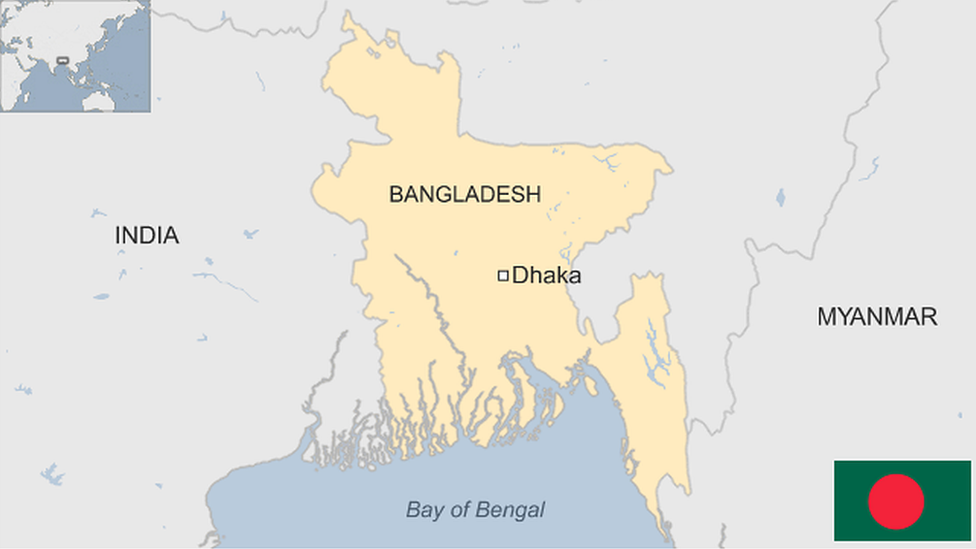Bangladesh Buddhists pick up pieces after mob rampage
- Published
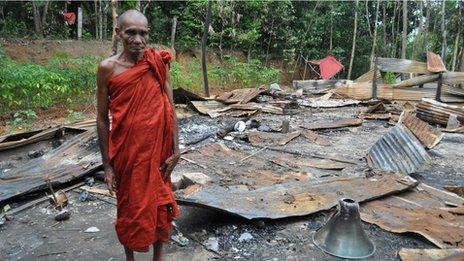
Hundreds of Buddhists lost their homes after the bloody clash in villages
Shashanko Barua's voice trembles when he recounts how he and his family ran for their lives to escape an angry Muslim mob last year.
They hid in a forest for a whole night near their village in the south-eastern Bangladeshi district of Cox's Bazar before returning home.
Mr Barua, a Buddhist, says that when he returned to the village, he found his small tin-roof house had been completely destroyed and all his belongings looted. His neighbours also faced similar fates.
Hundreds of Buddhists became homeless overnight after thousands of Muslims rampaged through villages, looting houses and burning down Buddhist temples.
While Bangladesh has witnessed bloody clashes between Muslims and minority Hindus in the past, it was a rare attack on the Buddhists.
'We had to run'
Local people say the violence went on for nearly six hours in various villages of the Ramu sub-division.
The protests were triggered after an image allegedly insulting the Koran was posted on the Facebook site of a Buddhist youth. Investigations by local media later revealed the youth had nothing to do with the incident.
"The mob first destroyed our temple and looted everything. Then they targeted our houses. We had to run, as I was worried that my teenage daughters could have been [sexually] abused," said Mr Barua, who is a day labourer.
"I am still scared to go out to work. I don't want to go too far to find work as I feel unsafe."
Since the attacks, the Buddhist community in this district near the border with Burma has been in shock. They still wonder with dismay how their own neighbours - Muslims who have been living with them in harmony for centuries - could turn against them.
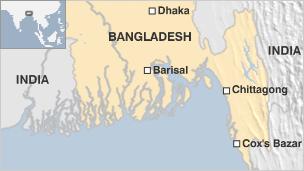
"There were people from all the major political parties among the rioters," said a community leader who did not want to be identified.
"Some were local leaders who are well-known to us. It is difficult for outsiders to know where these Buddhist temples are situated and which house belongs to the Buddhists."
Religious minority
Buddhists constitute less than 1% of Bangladesh's estimated population of more than 150 million. Around 90% of Bangladeshis are Muslims and Islam is the state religion.
Community leaders took me to various villages and temples destroyed during the riot in late September. Some of the temples were centuries-old and the main temple in Ramu, Sima Vihar is a famous tourist destination.
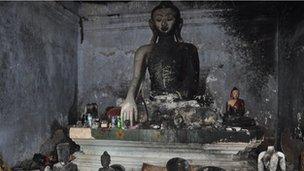
The violence was triggered by anger over a Facebook post
Buddhist monks say hundreds of precious metal and wooden idols of Lord Buddha were stolen during the riots and religious books in different languages were torched.
Buddhist leaders say the riots were not a spontaneous reaction to the alleged Koran insult. Tension had been building up in the area hours before the rampage, and they say hundreds of people were brought in trucks and vans from Cox's Bazar and Chittagong districts.
Some of them say the attacks were pre-planned and co-ordinated. They also blame the local police and the civil administration for not responding to their pleas when the attacks were going on.
"To destroy the 100-foot Buddhist statue in our temple, the rioters used seven locally-made bombs, tyres and gun powder. Luckily there was no major damage to the statue except for some cracks," said Ben Karunasri Bhikhu, a Buddhist monk at the Uttar Mitha Chori village.
'We are scared'
Villages far from Ramu sub-division were also targeted by the mob. In a few villages, Hindu temples and houses were also ransacked.
"The situation is calm now but we are scared. The real culprits have not been arrested. So, they are still threatening us," said Dr Rakal Chandro Kormokar, a doctor in the village of Ykong Bazaar, near the town of Teknaf.
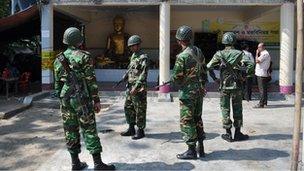
The army was deployed to secure the damaged Buddhist temples
Buddhist community leaders in the Ramu area, however, said they were satisfied with the swift response of Prime Minister Sheikh Hasina. She visited the area soon after the riots and ordered all destroyed temples and houses be rebuilt.
Reconstruction work has been going on under the direct supervision of soldiers and border guards. A stream of officials has visited the area, and politicians and civil society leaders have made the journey to show solidarity and support with the Buddhists.
"We have reassured the local people that these things will never occur in the future," said Home Minister Muhiuddin Khan Alamgir.
Although some try to link the attacks on Buddhists with the ethnic conflict between Rohingya Muslims and the majority Buddhist population in the neighbouring Burmese state of Rakhine, local people dismiss the notion.
Thousands of Rohingya Muslims fled to Bangladesh following communal violence last year in Rakhine state. For many it was out of the frying pan and into the fire.
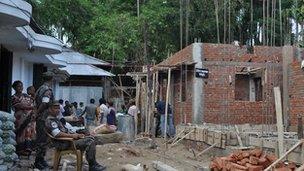
Residents have been rebuilding their houses but are still scared
But while the government has increased security around the Ramu area, many Buddhists still feel insecure. They say the majority Muslim community there should make efforts to reach out to them.
"Our neighbours were also involved in the attacks. So the government should take measures to make the local Muslim community show tolerance. Only that will bring a permanent solution and prevent such events in the future," said Nilutpal Barua, a teacher.
Bangladesh has long prided itself on having secular values, but the attacks on minority Buddhists and Hindus have dented this image.
Buddhists leaders say their temples and houses will be rebuilt soon, but it will take time for the emotional wounds to heal.
- Published30 September 2012
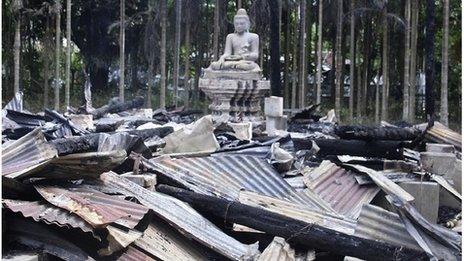
- Published25 November 2012
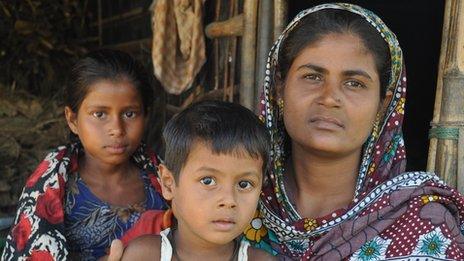
- Published10 March
